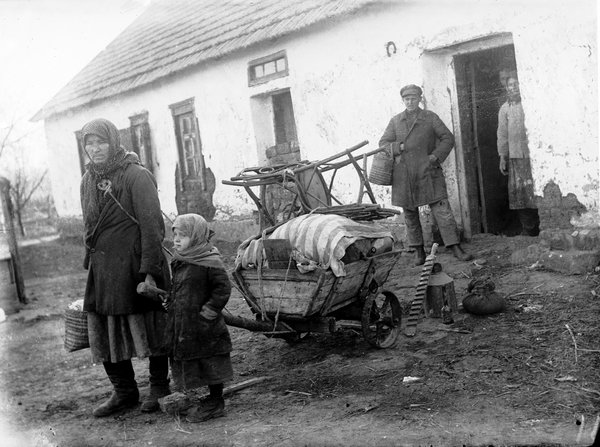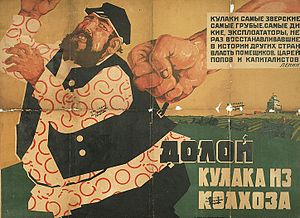You are a peasant worker, just like your father before you. He had been granted land due to the serf reforms in the early 1900’s and was able to be successful. Then the civil war breaks out, you go and fight for the reds even though many of the other prosperous peasants fight for the white. Following the war, you returned to your farm, ready to continue the success your father had started, and raise a family. Unfortunately, you are now deemed a “Kulak” by the government and are told you must surrender your land to the collective. Upon hearing that you must give up all that you and your family have worked for to the government, you resist and do not comply. Days later you hear a knock on your door, it’s the Soviet secret police, you are dragged out of your house and forced to leave.

(Kulak Deportation)
You are then separated from wife and children, you are taken and interrogated by the police to discover any hostile behaviors. After surviving your interrogation, you are put on a train to Siberia. There you are finally reunited with your family, you are given nothing but the instructions to start your life a new in the cold, unforgiving lands of Siberia. Sadly, this is what happened to many Kulaks and other peasants who opposed collectivization during the late 1920’s and early 1930’s. Those who were deported would be what I would consider the lucky ones, others were sent to labor camps, others in more extreme cases were even killed. This is all part of the “war” against the Kulaks or Dekulakization. Stalin used the Kulaks as scapegoats, they were blamed for the many food and shortages that besieged the Soviet Union as the result of collectivization.

(Anti-Kulak Soviet Propaganda)
A massive propaganda campaign was started to paint the Kulaks as greedy and as enemies of the state. However, you did not even have to be rich or a land-owning peasant to be considered a Kulak, any peasant who did not want to give up their land were labeled Kulaks. As stated before there was a wide range of punishments, at the very least they would be thrown out of their homes, and have all of their possessions taken, in the most extreme cases they were executed. This happened throughout the whole of the Soviet Union, with the worst case being in the region of Ukraine. Where food was taken from taken from the people and would result in a forced famine that would claim the lives of over 7 million people, all to destroy the Kulaks and anyone else you opposed collectivization.
Work Cited:
Siegelbaum, Lewis. “Collectivization.” Soviet history, http://soviethistory.msu.edu/1929-2/collectivization/. Accessed 18 March 2018
“Ku.” Marxist, https://www.marxists.org/glossary/terms/k/u.htm. Accessed 18 March 2018
Photos:
https://kulaks.weebly.com/what-happened-to-them.html
http://triptych.brynmawr.edu/cdm/singleitem/collection/Soviet/id/145/rec/52


Using the typical farmer to paint the picture of the treatment of many people in the U.S.S.R. is one that would draw a lot of sympathy. With all of the propaganda they put forth painting them as fat cats and greedy must have felt awkward for those who were like the hypothetical farmer you put forward. Sad story but necessary.
LikeLiked by 1 person
I love the images you included in this post and your style of writing made this post very interesting. I like how you mentioned that it didn’t really matter if someone was “technically” a kulak– if they opposed the policy, they were deported. I also find it interesting how this group was strategically chosen as a scapegoat, and I find the propaganda poster you included really interesting. Great work!
LikeLiked by 2 people
I really enjoyed how you wrote the two first paragraphs. The entire time i was able to visualize what it must of been like to be in that situation and the feelings they must have felt. The use of the images were timely with what i was reading that helped me visualize everything even better. Great post!
LikeLiked by 1 person
A very interesting post! The way that the Soviets used the Kulaks as scapegoats for their troubles reminds me of how the Nazis did the same thing to the Jews during World War II. Although the Kulaks were not rounded up and systematically annihilated, they two situations seem to have their origins in the same feelings of blame and resentment.
LikeLiked by 1 person
I love your writing style for this blogpost. It really helped paint a picture of how the Kulaks where so badly mistreated for doing nothing. Also it helped me to further understand what they had to go through as a group during this time. Great post!
LikeLiked by 1 person
Thanks everyone for the kind and supportive words, it’s greatly appreciated.
LikeLike
I liked the way you wrote this! It definitely made you realize how terrible this time of Soviet history was and how you didn’t have control over your life during this time. This part of history is not taught in school really and it should be. We were allies with the Soviets during the war and all the while they were killing millions of people just a few years before.
LikeLiked by 2 people
I agree — your point of view in this post is really compelling. Nicely done.
LikeLiked by 1 person
Do you think that Kulaks were targeted because they resisted collectivization, or because they probably sided with the Whites instead of with the Bolsheviks?
LikeLiked by 1 person
I believe it was a bit of both, but mainly resistance to collectivization since didn’t matter who you supported in the civil war if you resisted collectivization you would be targeted.
LikeLiked by 1 person
I was really compelled by your story. I found myself invested in the Kulak. It was interesting to see how different nations used different groups of people as scapegoats. Like one of the previous comments (Claire) mentioned, I am curious how this is/was taught in Russian schools.
LikeLiked by 1 person
I really liked your use of second person in this post- it draws in the reader a lot more and really makes them sympathize with the Kulaks. I didn’t realize the range included any farmer who owned land rather than those more successful. Interesting post!
LikeLiked by 1 person
This post is so interesting to me. Normally when we explore these things, we see them through the lens of historical writing or analysis. However, what you have done is put it in the first person so the reader has no choice but to face this dilemma. This is a really fascinating perspective. What do you think the modern ripples of this deportation are? How do you think it still impacts the culture of Russia today?
LikeLiked by 1 person
This was an excellent post, I really enjoyed your prose and the subject you covered. I thought you covered the Stalinist scapegoating tactics in regards to the Kulaks very well; I think this gives all of us a better perspective in how Stalin will apply these scapegoating tactics to other groups within Russia as well.
LikeLiked by 1 person